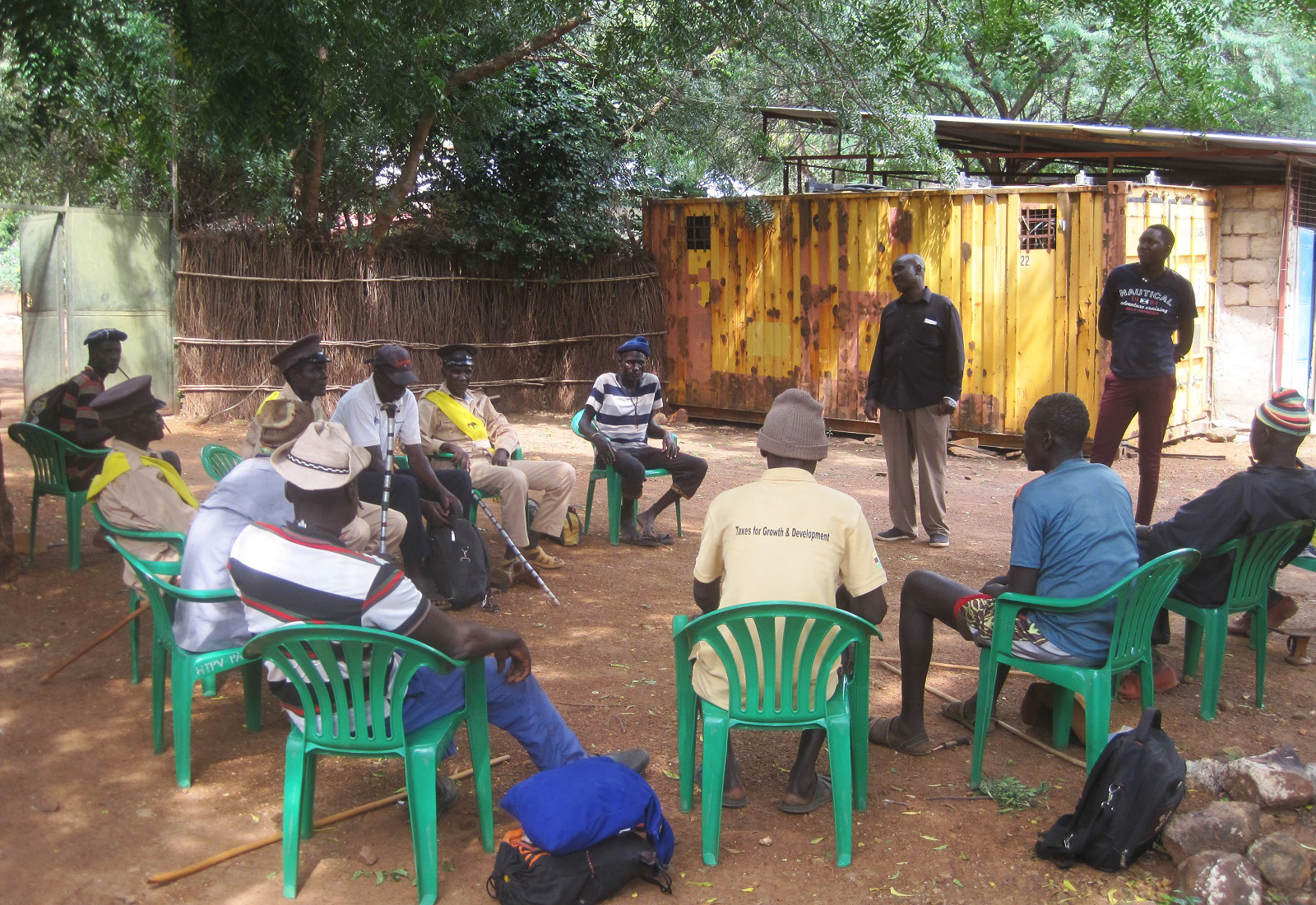
Peace Team leaders (standing) Romano Longole (left and Lokii Eliah lead a meeting with Toposa chiefs at Kuron Peace Village in a remote part of southeastern South Sudan. Maryknoll lay missioner Gabe Hurrish assists with the nonviolence and conflict-resolution initiatives of the Peace Team.
Maryknoll Lay Missioners recently completed a two-year assembly process that was designed “to establish a vision for how we can be effective in mission in the 21st century, given changes in our own composition as an organization, as well as changes in the church, U.S. society and the world.” This visioning process engaged and energized Maryknoll lay missioners, staff, board of directors and other stakeholders through discussions focused on reigniting passion and urgency for mission.
In February, the process culminated in a two-week “Expanded Mission Assembly,” during which delegates from every country where Maryknoll Lay Missioners serve gathered virtually to deliberate on the key questions that had emerged from the two-year assembly process. The “Expanded Mission Assembly” is a process envisioned by the association’s statutes to provide for broad consultation and representation when making key decisions.
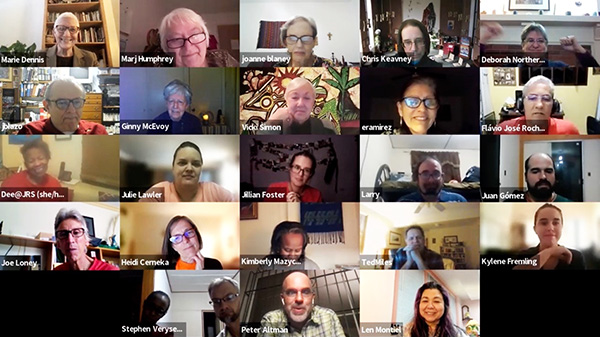
Screenshot from a session of the Expanded Mission Assembly in February 2022.
This year’s expanded assembly was led by outgoing director of mission Marj Humphrey and was the first in 13 years. United in purpose and commitment, the planning committee worked diligently together to support open, honest and fruitful discussions and discernment.
Some of the concrete questions the assembly process tackled included:
- What is our vision of mission, and what values guide us?
- Can we agree on a specific focus for ministry, aligned with our emerging vision and our values?
- Who are we as a community, and who can be part of this community?
- What structures and decision-making processes would best meet our needs and align with our renewed mission, vision, values and focus?
The major decisions made during the assembly included:
- Agreeing on nonviolence as a cross-cutting focus for Maryknoll Lay Missioners work;
- Revising mission, vision and values statements;
- Expanding membership eligibility;
- Adjusting several internal structures and decision-making procedures;
Mission, vision and values
The new mission, vision and values statements that emerged from the process are closely linked with the other outcomes of the assembly. In addition to being responsive to the signs of the times, they are reflective of such decisions as expanded terms of membership, renewed focus, and clarity of structures.
Their language is also reflective of a transition from a “sending” model to a model of mission more reflective of both a world church and church as a co-creator of the reign of God. New documents also reflect greater awareness of the history of international mission and its association with colonialism, and express a new understanding of mission that values mutuality, inclusion and responsibility for past legacies.
Other themes that receive a new emphasis in the statements are simplicity, community, growth and learning, resilience and joy, and a commitment to working with people on the margins of society.
Ultimately, after much rich discussion, the assembly chose the following new vision, mission, and values statements for Maryknoll Lay Missioners.
Vision
Justice, compassion, and dignity for all creation.
Mission
Compelled by faith to engage with people across cultures and ethnicities, we live, love and work with communities on the margins to promote active nonviolence and healing.
Values
![]() Simple Living: We embrace the interconnectedness of all creation and commit to ecological justice. By living simply, we participate in equitable access to the fullness of life for all.
Simple Living: We embrace the interconnectedness of all creation and commit to ecological justice. By living simply, we participate in equitable access to the fullness of life for all.
Community: We embrace the challenge to grow from the goodness of communion with each other and God. We strive for understanding, empathy and learning in relationships.
Joy: Amidst sin, suffering and death, we rejoice in the hope of the resurrection. We choose to live together creatively, celebrating the beauty and humor of everyday life.
Inclusion: By crossing borders of geography, culture, race, religion and ideology, we work for peace, understanding and wholeness. We recognize that dismantling unjust structures is critical to affecting real change. We commit to celebrating diversity in all that we do.
Humility: We enter into communities with listening hearts and openness. We honor the agency of the communities where we serve and the voice and wisdom of those who receive us.
New Ministry Focus
In addition, the assembly also defined active nonviolence as Maryknoll Lay Missioners’ new overarching and cross-cutting focus, encompassing three “legs”: prevention, intervention and restoration/reconciliation.
The assembly noted, “Although there are missioners who have been working in some aspect of nonviolence for a number of years, as a community we do not embark on this journey as experts. Instead, we recognize that we are beginning the process as learners, seeking the wisdom of other groups and individuals both in the communities who receive us and among other more experienced groups.
“While our new focus may not be a call for all our missioners to move immediately to new ministries,” the assembly stated, “it certainly is a call for everyone to reflect on how their ministry might contribute in some way to this new way of understanding our work. Over time we expect to be able to place new people in ministries that align with this focus and to adjust our ministries so that everyone is pulling together toward this common vision.”
As Marie Dennis, who facilitated the assembly and has been a prominent, long-time leader in promoting nonviolence, explained, “Nonviolence is a phenomenal witness to a world that is hungry for a new way to relate to each other. It’s a spirituality, it’s a way of life, it’s a global ethic. Our choice of nonviolence puts us in harmony with a world shift and joins us to many other groups and individuals that are embracing nonviolence and working to build a more peaceful world.”
Within this new focus of nonviolence, Maryknoll Lay Missioners will explore possibilities and pilot options for mission sites with a commitment of two to five years that require specialized skills or focus on a particular theme or population.
Membership and structures
Although the assembly chose many new initiatives and changes, they also reaffirmed many aspects of Maryknoll Lay Missioners’ current identity. They voted to remain a membership organization and an association of the faithful. They also wholeheartedly reaffirmed the identity of Maryknoll Lay Missioners as a Catholic organization, nourished by the sacraments, traditions and wisdom of the Catholic Church and grounded in the history and mission charism of Maryknoll.
With those foundations firmly in place, they were able to begin to explore more specific questions around who can apply to become a Maryknoll Lay missioner. Delegates approved taking initial steps toward widening eligibility criteria to extend to adults who are not U.S. citizens or permanent residents, thereby moving us toward becoming a more international and intercultural community. They also approved, on an experimental basis, welcoming applications from people of other faith traditions who feel drawn to living and working as missioners within the context of a Catholic community.
Delegates also approved changes to the organizational structures and decision-making processes needed to help Maryknoll Lay Missioners in its quest to be more effective and sustainable.
Delegates’ comments
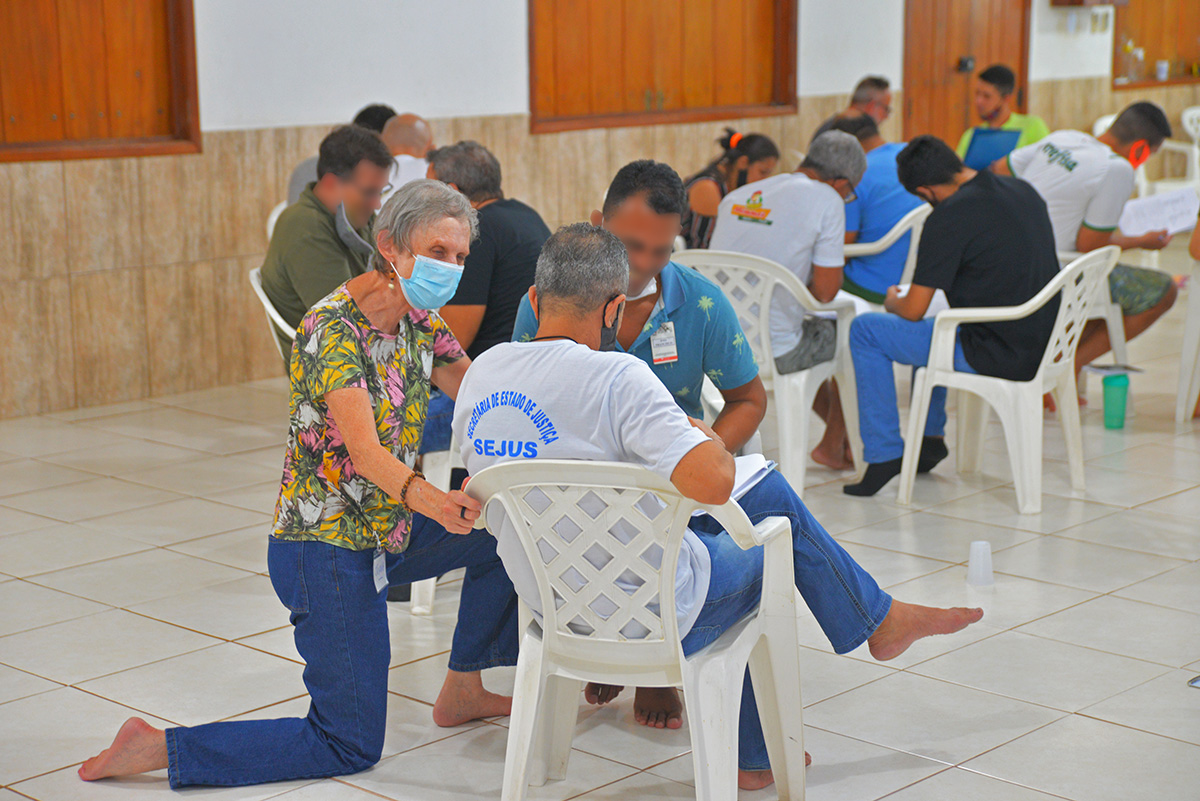
Joanne Blaney leading a restorative justice training with maximum-security prison inmates in Rondônia, Brazil.
Joanne Blaney, a veteran Maryknoll lay missioner who serves in Brazil, was one of the assembly delegates. She particularly likes the organization’s new overarching focus on nonviolence, which she sees as “a gospel response to the growing political and economic polarization, the growth of hate groups, racism and violence against women, migrants, etc. that is so rampant in our world today.”
Joanne expressed her hope “that we can continue to grow and deepen in ways to help people and communities heal, especially through a focus on dialogue and listening to the needs of the communities where we serve.” What energizes Joanne most is that “we have an opportunity to focus and respond more fully to the communities where we live and serve.”
She finds Pope Francis’ call to “universal fraternity” compelling and believes that Maryknoll Lay Missioners has a role in building “a world where there are no ‘others,’ no ‘them,’ there is only ‘us,’ the earth and its people. According to Francis, this fraternity is a love that is ‘capable of transcending borders.’ In opening up membership criteria to include those from other countries as well as non-Catholics, I think that the mission assembly delegates expressed a desire for membership criteria that would be reflective of authentic inclusion and mutuality.”
Juan Gomez, who serves in Bolivia, agreed that opening up membership to non-U.S. citizens/residents was an important step forward. He explained, “I think this reflects our authentic desire for our mission work to be level with the people and communities we work with. If only U.S. citizens can be Maryknoll lay missioners, that sends a few messages: one, that U.S. citizens are the only ones with the skills and resources to help others — or in other words, ‘We are better than you.’ And two, being a missioner is a privilege that we want to keep for ourselves.”
He said that he is convinced that “opening up our organization to other cultures and nationalities is going to enrich us so much, making our mission work deeper, more meaningful and more impactful.”
Flávio José Rocha of Brazil agreed that the moves toward “opening Maryknoll Lay Missioners to candidates from other countries and for non-Catholics are the most important decisions made in our assembly. Even though I know it will bring many challenges for our organization, at the same time I believe that those challenges will lead us to act in a new way in mission, becoming more inclusive and respectful to our local realities.”
Flávio said he felt that “the delegates were pretty much in sync on most of the questions. I didn’t feel that we had major conflicts, which to me was both surprising and a sign that we were acting under the same Spirit.”
Juan too was glad that the assembly delegates “were able to make big decisions in such different areas. But what surprised me even more was that all but one of those decisions were reached by consensus. This in my opinion was only possible through the working of the Holy Spirit.”
Julie Lawler from Cambodia echoed Flávio and Juan’s experience. For her, “The decision to move to nonviolence as a focus truly felt Spirit-led. The decision wasn’t clear at the beginning of our expanded mission assembly, but through our zoom sessions over the two weeks and through prayer and discernment, the Holy Spirit moved this vote through! I am excited to see what the Holy Spirit has in store for Maryknoll Lay Missioners. In prayer you have to say ‘yes’ first and then the Spirit will lead you on the path. That is the peace I feel at this decision. It was totally the Holy Spirit working in making this decision.”
With regard to the new mission statement, Juan emphasized the inclusion of the word “love.” From his experience in mission, he believes “that the biggest impact we make as an organization and what sets us apart from many other NGOs and foundations is that we love what we do, and whatever we do we do it with love. We love the communities we work with, we love the people we accompany. ‘God is love,’ St. John repeatedly says in his Gospel and letters. And I believe that love is Maryknoll Lay Missioners’ way to evangelize.”
Since the conclusion of the Expanded Mission Assembly, Maryknoll Lay Missioners has been busy implementing this renewed vision and the organizational changes that were rooted in it. New director of mission Elvira Ramirez said, “All of our missioners, along with our staff and board, have embraced this vision for Maryknoll Lay Missioners and are now together engaged in fleshing and living it out.”


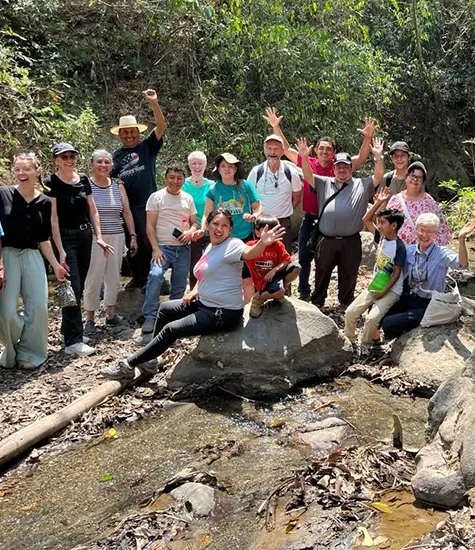
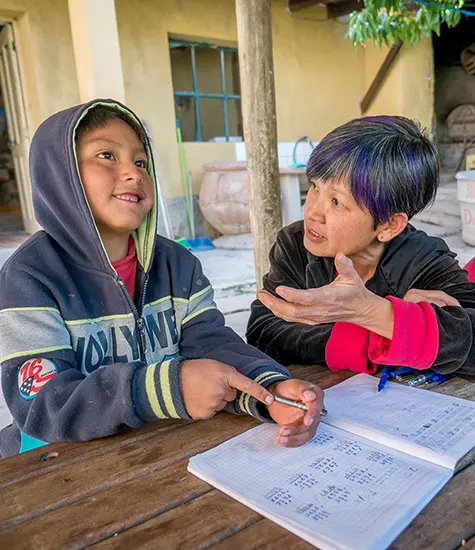
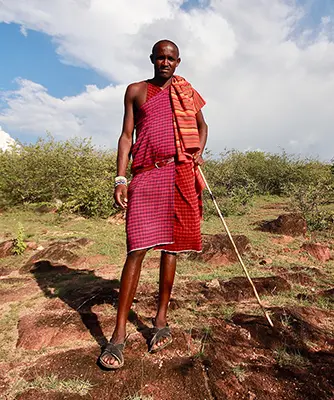




Just thankful for the work you do, the insights that bring hope and compassion and justice to a very broken world!
Right on!
Excited to be part of these new directions!
What a wonderful way of stating what you do and why you do it.